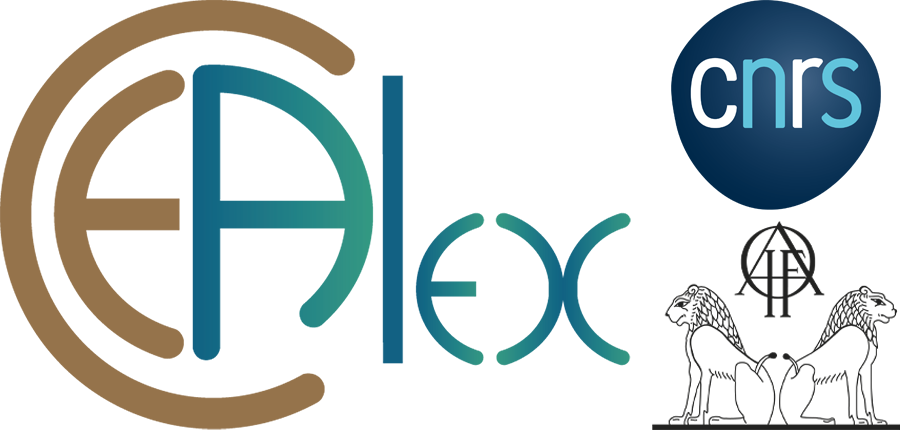Institutional partnerships
Partnerships in Egypt
The Egyptian Ministry of Antiquities
The Egyptian Ministry of Antiquities is our primary partner. It is this institution, through the Permanent Committees for Pharaonic Antiquities and for Islamic and Coptic Antiquities, that grants us annual excavation, prospection and study permits. Our work is monitored by inspectors, restorers and engineers from the Ministry. In addition, the Ministry has generously given us access to the Tabiyet Nahassin building in Shallalat Gardens, at the very heart of Alexandria, in which objects unearthed during CEAlex excavations are conserved, restored and studied. For our part, we conduct topography operations on excavations carried out by the Ministry, we engage in the restoration of artefacts, particularly mosaics, uncovered during these excavations, and, when the need arises, we set up specific training courses for Ministry staff.
The CEAlex enjoys a variety of collaborations with Alexandria University’s Faculty of Arts, Faculty of Tourism and Faculty of Fine Arts, but one of the most important is that which has developed over the last ten years around the collection of antiquities in the Faculty of Arts’ Educational Museum. This has led to photographic coverage of the entire collection, targeted restoration campaigns, the development of a computer database for the management of the collections and a joint bilingual publication in the Études Alexandrines series.
The European EduMust programme
The CEAlex is a partner in the European project entitled Education and Capacity Building in Museum Studies (EduMUST, 2016-2019) alongside five Egyptian universities (Ain Shams University, French University of Egypt, Alexandria University, Damanhour University, Helwan University), the Egyptian Ministry of Antiquities, European academic partners (École du Louvre, University of Southampton, Democritus University of Thrace) and the Royal Museum of Mariemont (Belgium). The aim of the project, which is part of the Egyptian museum development plan, is to create and implement Masters-level teaching programmes in museum studies in Egypt for people from a variety of fields (archaeology, history, architecture, engineering, tourism, management, etc.). These courses, designed for students and museum professionals, will offer the acquisition of theoretical and practical knowledge, while promoting new teaching methods using digital tools, thanks to the involvement of engineering researchers and the creation of a database incorporating 200 objects from the collection of the Alexandria University Faculty of Arts Museum (texts and 3D images).
The CEAlex participates in the Bibliotheca Alexandrina’s scientific and educational activities, with regular events and conferences.
The American University in Cairo etthe Dominican Institute of Oriental Studies
Both the AUC and the IDEO are partners of the CEAlex archives department in the programme to collect, digitise and make available copies of the French-language press in Egypt.
International partnerships
The Honor Frost Foundation was founded in 2011 with a major bequest from the late Honor Frost. The Foundation’s mission is to promote the development and research, including publication, of maritime archaeology, with a particular, but not exclusive, focus on the eastern Mediterranean, with an emphasis on Lebanon, Syria and Cyprus. It supports CEAlex research and excavations at the foot of Fort Qaitbay and on offshore wrecks.
The VICI programme, Innovating objects, was developed by Miguel John Versluys, professor at the University of Leiden, with the CEAlex and the Forschungstelle Asia Minor as partners. Its aims are:
- to carry out an in-depth interdisciplinary study of the material inventory of three key archaeological sites (Samosata, Alexandria and Rome) in order to examine how and why the introduction of new innovative objects may have been the source of change and innovation.
- to provide a new interpretation of the formation of the Roman Empire from this perspective and in the context of greatly increased interdependence within Eurasia between 200 and 30 BC
- to examine the historical relationship between innovation and globalisation.
Ege University of Izmir, Faculty of Arts, Archaeology Department
Study of amphora consumption in Alexandria and the development of a lexicon of amphora stamp dies.
Partnerships with French institutions
The Association for the Remembrance of Ferdinand de Lesseps and the Suez Canal
The digitising and online publication of documents relating to the French-language press of the Suez Canal have made it possible, on the one hand, to save this journalistic heritage and, on the other, to offer new resources that can be explored more easily and in greater depth thanks to new computerised research tools.
Filmed interviews are a means of collecting personal testimonies which, if not recorded soon, are in danger of disappearing, simply because of the age of the interviewees. They represent a particular resource, oral memories, which must be analysed in a particular manner by specialists in the humanities and social sciences.
Bibliothèque nationale de France
The CEAlex participates in the “Bibliothèques d’Orient” (Libraries of the Orient) portal along with a number of institutions around the Mediterranean. This portal aims to highlight the documents held by these establishments that bear witness to France’s relations with each of the countries of the Eastern Mediterranean from the end of the 18th century until 1945.
The CEAlex engages with the EFA through the study of Hellenistic Period material culture, the documentation of amphora stamps unearthed in Delos and held in the National Museum of Athens, and new archaeological, architectural, ceramic and archaeometric surveys of House of the Masks site on Delos.
The CEAlex has collaborated with INRAP over many years on salvage excavations of both domestic and funerary contexts, and their publications.
Maison Méditerranéenne des Sciences de l’homme d’Aix-en-Provence
Collaboration in the CIRILI, HYDRΩMED et WATERTRACES, programmes, supported by the Amidex Foundation.
Various partnerships with the following laboratories through scholars engaged in Alexandria-related research:
- Arscan
- Archéozoologie et Archéobotanique – Sociétés, Pratiques et Environnements
UMR 7209 – AASPE - Archéologie et Archéométrie
- ArchéoOrient
- C2RMF
- Centre Camille Jullian
- EPHE, Section des Sciences historiques et Philologiques
- HiSoMA
- Institut de recherche sur les Archéomatériaux
- Institut de recherche sur l’architecture antique
- Laboratoire d’Archéologie Médiévale et Moderne en Méditerranée
- Orient et Méditerranée
